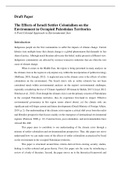Draft Paper
The Effects of Israeli Settler Colonialism on the
Environment in Occupied Palestinian Territories
A Post-Colonial Approach to Environmental Just
Introduction
Indigenous people are the first communities to suffer the impacts of climate change. Current
debates state multiple times that climate change is a global phenomenon that demands its fair
share of justice. Although much literature advocates this belief, reality presents a different view.
Indigenous communities are affected by resource-extractive industries that are often the root
cause of climate change.
When it comes to the Middle East, the region is being presented in many analyses on
the climate crisis in the region in a dystopian way within the incorporation of political ecology
(Hoffman, 2018; Sayegh, 2012). A neglected area in the climate crisis is the effects of settler
colonialism on the environment. The Israeli state's role as settler colonists has not been
considered much within environmental analyses on the region's environmental challenges,
especially considering the rise of 'Climate Apartheid' (Weizman & Sheikh, 2015; Lloyd, 2012;
Feitelson et al., 2012). Even though the climate crisis is not the primary concern of Palestinians
in the occupied Palestinian territories, they do experience first-hand its impact. Effective
environmental governance in this region seems almost absent, yet the climate risks are
significant and will shape current and future developments (Dutch Ministry of Foreign Affairs,
2019, p. 2). Our understanding of the climate crisis requires a critical shift away from the realist
and liberalist perspective that focuses mainly on the emergence of international environmental
regimes (Paterson, 2000, p. 12). Constructivists, post-colonialists, and environmentalists have
stressed this shift.
This paper aims to contribute to our understanding of the climate crisis through a
mixture of settler-colonialism and environmentalism perspectives. Thus, this paper sets out to
understand how we can make sense of the effects of settler colonialism as practiced by Israel
on the environment in the occupied Palestinian territories.
This paper is structured around three criteria derived from existing security studies,
linking to settler-colonial and green theory. First, this paper sets the scene by introducing a
review of a body of literature. Second, the paper moves on to the theoretical framework and
, operationalization of settler-colonial and green theory. The third section presents a case study
on Israel-Palestine. Finally, the conclusion draws all the remaining ends together. For space
reasons, this paper does not deal with a detailed historical narrative on the Israel-Palestinian
conflict.
I. Literature Review
Moore (2017) clearly defined his stance on the debate between the meanings of the
Anthropocene and Capitalocene and its contributions that have led us to the current
environmental injustices. He draws attention by framing his perspective as one that majorly
opposes the Anthropocene science and even perceives it to be a great challenge to world-
ecological theories. Moore (2017, pp. 620-621) does this by defining Capitalocene as capitalism,
a way of organizing nature, and to be the contributors to the production of a system based on
the appropriation of nature, that leads us to the origins of the ecological crisis. Moore (2017,
pp. 620-621) builds his argument on what he classifies as the Anthropocene science's supposed
failings. His somewhat Marxist concept of Cheap Nature argues that the Cheap Nature is a
system of domination, appropriation, and exploitation that recognizes the diversity of human
and extra-human activity as crucial components needed for capitalist development, but in return
is not vaporized into the monetary economy.
Nonetheless, Moore (2017) provides, within his argument on the Capitalocene, the
effects of colonialism on indigenous communities' ecological system. He does so by drawing
upon past events from the Dutch colonial era, explicitly zooming into the Spice Islands, also
known as Maluku. Moore (2017, p. 619) demonstrates the usage of colonial policies to mobilize
labor, yet at the same time, it served as a facilitator of a wave of diseases, thereby disrupting
long-existing agricultural and trade patterns. To some extent, his analysis of colonialism in
relationship to the ecological crisis shows that its effects reach far into our global systems.
Hoffman (2018) broadens Moore's perspective on post-colonialistic effects concerning
the ecological crisis. Hoffman (2018) starts by revisiting the concepts of environmental
determinism and orientalism. He argues that both concepts take a stance towards the post-
colonial state's role as the over-exploiter of nature and that this role should not be left out in the
analysis of climate change nor ignored. Instead, Hoffman (2018, p. 95) proposes that this role
should instead be in the context of geopolitics and the competitive world order. Besides, he
calls out that the capitalist appropriation of nature is not only visible in environmental
orientalism, as Moore (2017) presents, but that it is also deeply entrenched in the political-
ecological thought (Hoffman, 2018, p. 97).





